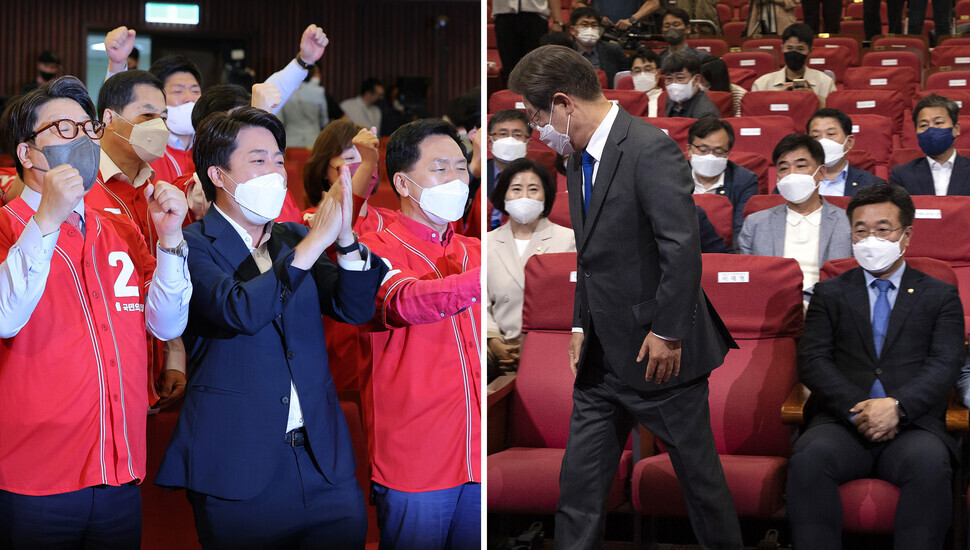hankyoreh
Links to other country sites 다른 나라 사이트 링크
Election fatigue, lack of galvanizing issues leads to dismal turnout in S. Korea’s local elections

The turnout in Korea’s eighth nationwide local elections, held on Wednesday, amounted to 50.9%. That was the second-lowest turnout since Korea began holding local elections, with the lowest on record being 48.8% in the 2002 local elections.
The low turnout appeared to be a result of multiple factors, including the lack of major issues to draw out voters and “election fatigue” at having to show up at the polls a mere 84 days after the presidential election in March.
According to the National Election Commission, voter turnout around the country on Wednesday amounted to 50.9%, which was 9.3 points lower than the turnout (60.2%) in the last round of local elections four years ago, on June 13, 2018.
Among Korea’s 17 metropolises and provinces, the areas with the highest voter turnout were South Jeolla Province (58.5%), followed by Gangwon Province (57.8%), South Gyeongsang Province (53.4%) and Seoul (53.2%). Areas where turnout was lower than the national average included Gyeonggi Province (50.6%), Incheon (48.9%), Daegu (43.2%) and Busan (49.1%). The lowest turnout of all was reported in Gwangju (37.7%).
Korea’s second-lowest voter turnout in local elections is thought to result from electoral fatigue, given the fact that the new administration has just taken over following a presidential election less than three months ago. The low turnout of voters in their 20s and 30s was probably another major factor, analysts say.
“It doesn’t appear that a large number of young people came to the polls this election, which was also true of the presidential election and the by-election for mayor of Seoul last year,” said Eom Gyeong-yeong, director of the Zeitgeist Institute.
A poll of voter attitudes in the eighth local elections, which Gallup Korea conducted by surveying 1,505 voters around the country aged 18 and above on May 22-23 on behalf of the National Election Commission, found that 79.6% of all respondents were interested in the elections. But only 56.7% of people aged 18-29 expressed interest, which was 22.9 points lower than the overall response as well as 15.8 points lower than that age group’s interest when the same questions were asked four years ago.
Other causes of the low turnout appear to be the absence of issues big enough to galvanize voters and the Democratic Party’s failure to bring its voters to the polls, given its lack of remorse and reform following its defeat in the presidential election.
By Kim Kyu-nam, staff reporter
Please direct questions or comments to [english@hani.co.kr]

Editorial・opinion
![[Editorial] Intensifying US-China rivalry means Seoul must address uncertainty with Beijing sooner than later [Editorial] Intensifying US-China rivalry means Seoul must address uncertainty with Beijing sooner than later](https://flexible.img.hani.co.kr/flexible/normal/500/300/imgdb/original/2024/0517/8117159322045222.jpg) [Editorial] Intensifying US-China rivalry means Seoul must address uncertainty with Beijing sooner than later
[Editorial] Intensifying US-China rivalry means Seoul must address uncertainty with Beijing sooner than later![[Column] When ‘fairness’ means hate and violence [Column] When ‘fairness’ means hate and violence](https://flexible.img.hani.co.kr/flexible/normal/500/300/imgdb/original/2024/0516/7417158465908824.jpg) [Column] When ‘fairness’ means hate and violence
[Column] When ‘fairness’ means hate and violence- [Editorial] Yoon must stop abusing authority to shield himself from investigation
- [Column] US troop withdrawal from Korea could be the Acheson Line all over
- [Column] How to win back readers who’ve turned to YouTube for news
- [Column] Welcome to the president’s pity party
- [Editorial] Korea must respond firmly to Japan’s attempt to usurp Line
- [Editorial] Transfers of prosecutors investigating Korea’s first lady send chilling message
- [Column] Will Seoul’s ties with Moscow really recover on their own?
- [Column] Samsung’s ‘lost decade’ and Lee Jae-yong’s mismatched chopsticks
Most viewed articles
- 1For new generation of Chinese artists, discontent is disobedience
- 2[Editorial] Transfers of prosecutors investigating Korea’s first lady send chilling message
- 3[Exclusive] Unearthed memo suggests Gwangju Uprising missing may have been cremated
- 4[Editorial] Intensifying US-China rivalry means Seoul must address uncertainty with Beijing sooner t
- 5S. Korea “monitoring developments” after report of secret Chinese police station in Seoul
- 6N. Korean media upgrades epithet for leader’s daughter from “beloved” to “respected”
- 7Yoon says concern about biased diplomacy is being incited by “communist totalitarian forces”
- 8[Column] US troop withdrawal from Korea could be the Acheson Line all over
- 9Xi, Putin ‘oppose acts of military intimidation’ against N. Korea by US in joint statement
- 1060% of young Koreans see no need to have kids after marriage